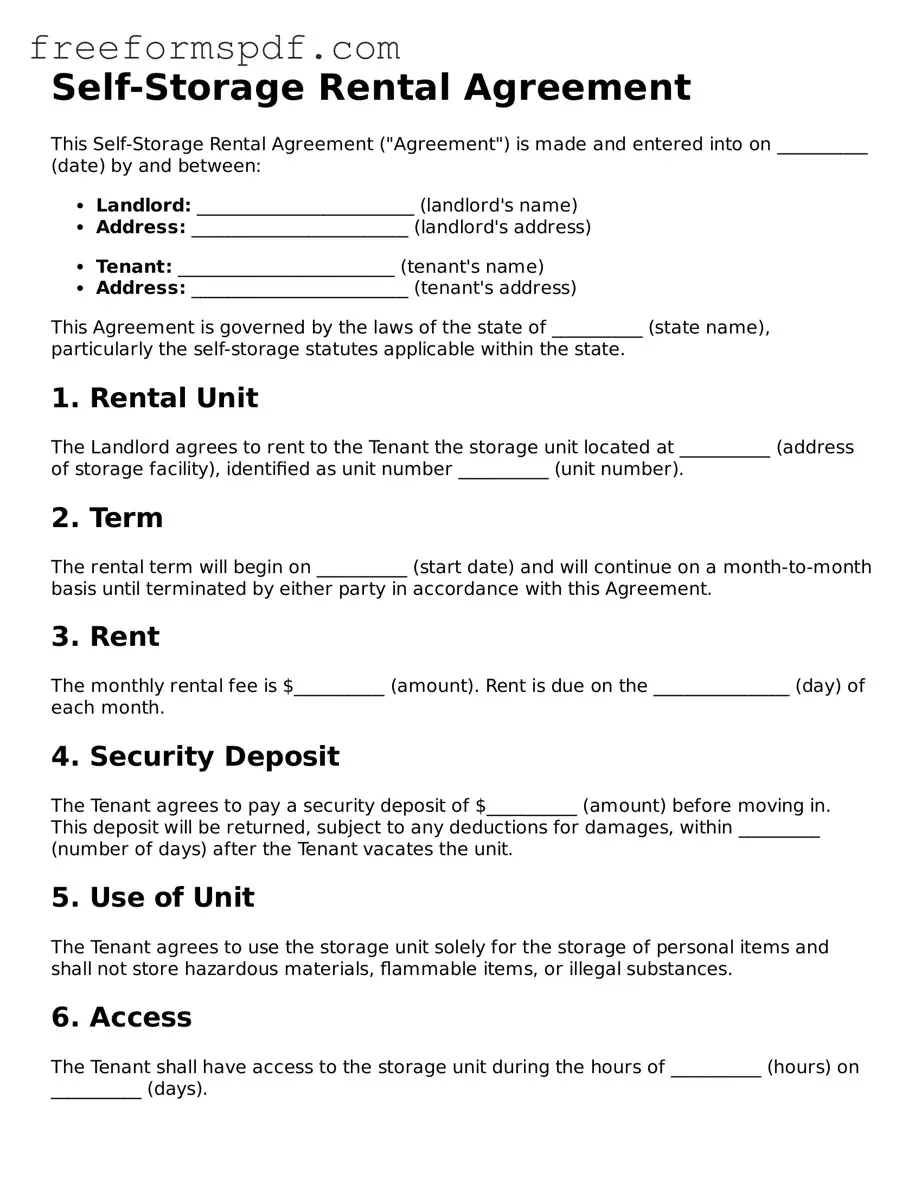Self-Storage Rental Agreement Document
Common mistakes
-
Failing to provide accurate personal information.
Many individuals overlook the importance of entering their full name, address, and contact information correctly. This can lead to communication issues and delays in processing the agreement.
-
Not reading the terms and conditions thoroughly.
People often sign the agreement without fully understanding the terms. This can result in unexpected fees or restrictions on access to the storage unit.
-
Omitting details about the stored items.
Some renters forget to specify what items they will store. This information is crucial for insurance purposes and helps the facility manage its inventory.
-
Ignoring the payment schedule.
Individuals may neglect to note the due dates for payments. Missing a payment can lead to late fees or even loss of access to the unit.
-
Not asking questions when uncertain.
Many people hesitate to seek clarification on points they do not understand. It is important to ask questions to ensure that all aspects of the agreement are clear.
Learn More on This Form
-
What is a Self-Storage Rental Agreement?
A Self-Storage Rental Agreement is a legal document that outlines the terms and conditions between a storage facility and a customer renting a storage unit. This agreement details important information such as the rental period, payment terms, security measures, and the rights and responsibilities of both parties. It serves to protect both the storage provider and the renter by clearly defining expectations.
-
What should I look for in a Self-Storage Rental Agreement?
When reviewing a Self-Storage Rental Agreement, pay close attention to the following elements:
- Rental Duration: Understand the length of the rental period and any options for renewal.
- Payment Terms: Check the amount due, payment methods accepted, and any late fees that may apply.
- Access and Security: Review the access hours to your unit and the security measures in place to protect your belongings.
- Insurance Requirements: Determine if you need to provide insurance for your stored items or if the facility offers coverage.
-
Can I terminate the agreement early?
Yes, you can often terminate the Self-Storage Rental Agreement early, but the specific terms will be outlined in the document. Some facilities may require a notice period before you can vacate the unit. Be sure to read this section carefully to avoid unexpected charges or penalties.
-
What happens if I miss a payment?
If you miss a payment, the consequences will be specified in the agreement. Typically, storage facilities may charge a late fee and may restrict access to your unit until the payment is made. If payments continue to be missed, the facility may have the right to auction off your belongings to recover the unpaid rent. Always communicate with the facility if you anticipate a payment issue.
Misconceptions
Understanding the Self-Storage Rental Agreement is crucial for both tenants and storage facility owners. However, several misconceptions can lead to confusion. Here are seven common misconceptions:
-
All self-storage agreements are the same.
Each facility may have different terms, fees, and conditions. Always read the specific agreement for the facility you choose.
-
You can store anything you want.
Most facilities have restrictions on certain items, such as hazardous materials, perishables, or illegal items. Check the agreement for specific rules.
-
Your belongings are automatically insured.
Insurance is often not included in the rental agreement. You may need to purchase separate coverage for your items.
-
You can access your unit anytime.
Some facilities have restricted hours for access. Verify the access hours in your rental agreement.
-
Late fees are negotiable.
Most agreements clearly outline late fees. These fees are typically non-negotiable, so it's important to pay on time.
-
All storage units are climate-controlled.
Not all units have climate control. If your items are sensitive to temperature or humidity, ensure you select a unit that offers climate control.
-
You can cancel anytime without penalty.
Many agreements require advance notice for cancellation. Review the terms to understand any potential penalties.
Being informed about these misconceptions can help you make better decisions regarding your self-storage needs. Always read the rental agreement carefully and ask questions if anything is unclear.
Other Types of Self-Storage Rental Agreement Forms:
Parking Agreement Contract - It includes payment terms for the lease of the garage space.
In order to create a thriving rental relationship, it's essential for both landlords and tenants to familiarize themselves with the necessary documentation, particularly the Arizona Lease Agreement form. This form not only delineates the responsibilities of each party but also plays a pivotal role in minimizing misunderstandings. To access the form and ensure that all specifications are meticulously addressed, you can visit Arizona PDF Forms, which provides a comprehensive resource for these legal agreements.
360 Photo Booth Contract Pdf - It provides information about the power supply requirements for the booth.
